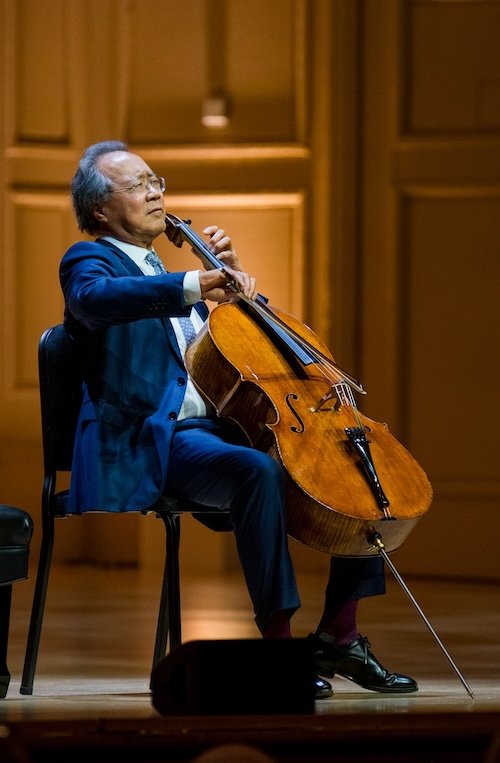Yo-Yo Ma performed Bach’s complete Cello Suites Friday night at Symphony Hall for the Celebrity Series. Photo: Robert Torres
Seventieth birthdays are big deals. When Leonard Bernstein marked the milestone in 1988, the Boston Symphony threw him a three-day-long bash at Tanglewood that included a three-hour concert in the Koussevitzky Shed.
Yo-Yo Ma, who became a septuagenarian in October, took a slightly different route on Friday night with a three-hour-long concert of his own that celebrated music, community, and shared humanity. Styled “We the People,” the cellist described the event, which was presented by the Celebrity Series at Symphony Hall and simulcast live to locations throughout the Commonwealth, as “a party…just without food.”
Not to worry. Ma provided sustenance of the musical, spiritual, and intellectual types, with a helping or two of community building added for good measure. The last has increasingly been at the center of his artistry, first through The Bach Project and, more recently, Our Common Nature, programs that seek to bridge social, economic, political, and cultural divides through music.
On Friday, the music in question was J. S. Bach’s six Cello Suites, works Ma has been playing virtually all his life and has recorded three times. Remarkably, though, the longtime Cambridge resident had never previously presented the complete set at a concert in Boston.
To judge from his recordings, Ma is no interventionist when it comes to the Suites. Neither is he a period-instrument purist. Rather, his approach combines the best of both practices: tonally rich, keeping the musical line front-and-center, rigorously adhering to repeats, and never losing sight of the underlying character of the music.
While Friday’s traversal didn’t exactly offer a narrative of life, it did mine—and very powerfully—the depths of expression latent in this music as well as its undying freshness. Indeed, by the time Ma got to the Suite No. 6 one was struck anew, if not bowled over, by the music’s seemingly endless capacity for invention, creativity, and recreation.
Part of the fascination of the night’s performances lay, especially, in the early Suites, in the inwardness of Ma’s playing. The G-major installment was breathtakingly hushed and wonder-filled, from its improvisatory-sounding Prélude right on through to the cellist’s stomping, swaggering account of the Gigue.
In the more reflective Suite No. 2, Ma brought inexorable rhythmic drive and a huge dynamic range to the searching Prélude as well as tumultuous energy to its Courante. His repeats of the Sarabande’s two halves offered subtle shifts of tone and phrasing, while attacks in the Minuets were aptly rough.
To be sure, his readings on Friday didn’t shy away from the essential earthiness of this music, even when it reaches for the transcendent. The exuberant C-major Suite’s finale provided one such glorious demonstration of this approach. So did its Prélude—the raw bariolage episodes seemed to reflect, aurally, the gold light bathing the stage—and set of Bourrées, each of which were enchantingly, knowingly coy.
Meanwhile Ma’s take on the Fourth Suite’s thickets of implied counterpoint was a model of well-directed, luminously voiced playing, the Courante deliciously droll and Sarabande impeccably pure. Yet it was the Allemande, with its redeployment of a little, throwaway figure from the Prélude that seemed to be the key to unlocking the larger work: here, the little things were the gateway to grasping the bigger, dancing picture.
The latter pair of Suites were played without a break, Ma dedicating No. 5 to all those “who have experienced loss” and firing No. 6 with a sense of purpose and joy that belied both his age and the night’s late hour (even without intermission, he didn’t strike up the latter’s first bars until after 10:30). The sense of release the cellist drew from the D-major matched the pathos and warmth that imbued his reading of the C-minor, especially the night’s unaffectedly absorbing account of its haunting Sarabande.
Between and after the first four Suites, Ma offered commentaries tying the music to a vision of renewed community and shared values: if all of us can come from different walks of life to listen to Bach, what more can we do together? That’s a noble undertaking, though some of Friday’s presentation seemed more naïve and wishful than practical or concretely applicable (“What is your dream for your community in 2050?” a card inserted into the programs that we were instructed to fill out and exchange with our neighbors asked).
Nevertheless, you’ve got to start somewhere and it’s hard to begrudge Ma his optimism or his faith in humanity, which seem to inform everything he does. Both were on display in the night’s encore, which saw Boston mayor Michelle Wu join him for the Bach/Gounod “Ave Maria.”
Given Ma’s pedigree—he made his national debut following a John F. Kennedy speech on “An American Pageant for the Arts” in 1962 (a broadcast that was emceed, coincidentally, by Bernstein)—the pairing of a music-loving politician with the world’s most famous cellist is almost to be expected. As it happens, Wu showed herself a fine, sensitive pianist and the ovation for their duet, even from the thinned-out crowd that stuck around past 11 p.m. to hear it, was vociferous.
The Celebrity Series presents accordionist Théo Ould playing music by Bach, Piazzolla, Bartók, Villa-Lobos, and others 7:30 p.m. December 2 at Pickman Hall. celebrityseries.org
Posted in Performances











